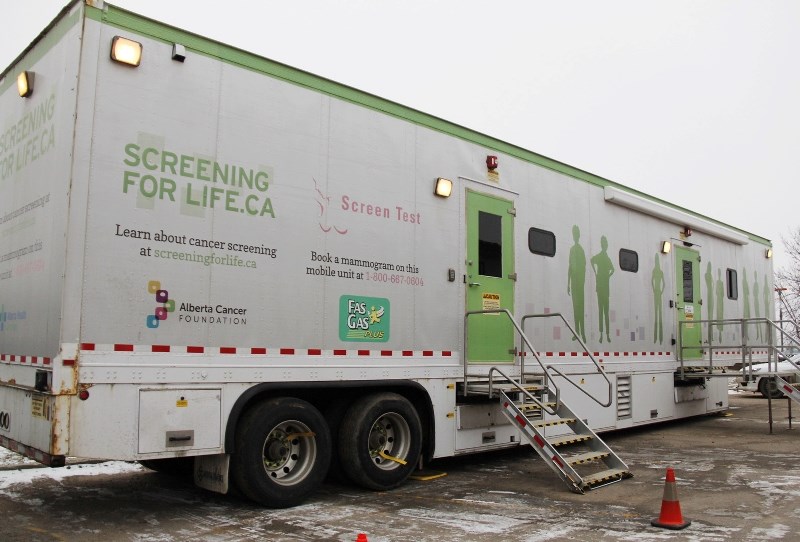One in eight Alberta women will be diagnosed with breast cancer in their lifetime.
“Breast cancer is still the most common type of cancer found in women in Alberta," said Harmony McRae, health promotion facilitator with Screen Test. “The good news is, it’s no longer the most fatal disease."
According to McRae, the likelihood of survival after five years of diagnosis is about 90 per cent, a statistic that has increased over the years due to awareness and advancements in treatment.
“It’s mainly by early detection. With mammograms, we can find breast cancer early, about two to three years before it becomes big enough to be felt as a lump,” McRae explained. “That’s why we want ladies to come out and get checked, not just once, but making sure you have regular mammograms, because that’s when we can find changes in the tissue."
Screen Test is a mobile mammography clinic that travels to rural municipalities offering breast cancer screenings. The unit is part of Alberta Health Services.
“These clinics are really important. The whole reason Screen Test started in 1991 was we wanted to make sure ladies in rural communities had access to screening, because typically they don’t,” added McRae.
Currently, Screen Test serves 25 Métis and First Nations communities, including their next scheduled stop at the Elizabeth Métis Settlement. The clinic will be set-up at the community hall from Oct. 29 to 30, and will be offering free breast cancer screenings to women aged 50 to 74.
“Screen Test is a really unique service because it’s mobile. It can go to a lot of places that other services can’t get to,” McRae expressed. “We’re one of those services that come out to so many of those communities. We know that women in Indigenous communities are underserved, and we want to make sure they have access to that service."
The test takes about 10 minutes, and although it can be uncomfortable for some, McRae stresses that the few minutes of discomfort is worth the peace of mind.
Booking an appointment in advance and showing up a few minutes early the day-of is recommended.
“We have a short questionnaire that asks about breast health and your family history of breast cancer. That helps us figure out what risk you are, and how often you need to get called back. It takes about five minutes before your appointment,” explained McRae, adding patients are also asked to wear a separate top and bottom, and no deodorant, because it can affect the images.
Once the x-ray is finished, "you're free to go," she added.
“You’ll get your results in the mail about three weeks after your appointment."
For women who find the x-ray uncomfortable, McRae suggests taking a Tylenol prior to the appointment and avoiding drinking coffee beforehand.
Although the test is aimed at women between the ages of 50 and 74, anyone between the ages of 40 to 49 can request a screening through a referral from their doctor.
"Once they turn 50, up until the age of 74 they should get screened every two years. That’s the group we want to focus on, and they don’t need a referral,” McRae detailed.
Screen Test will be set-up in Cold Lake First Nations Oct. 25 to 26, Kehewin Nov. 5 and 6, and in Bonnyville from Jan. 3 to 12, 2019.
In order to book an appointment, call Screen Test at 1-800-667-0604. For more information about the clinic, visit screeningforlife.ca/screentest.



